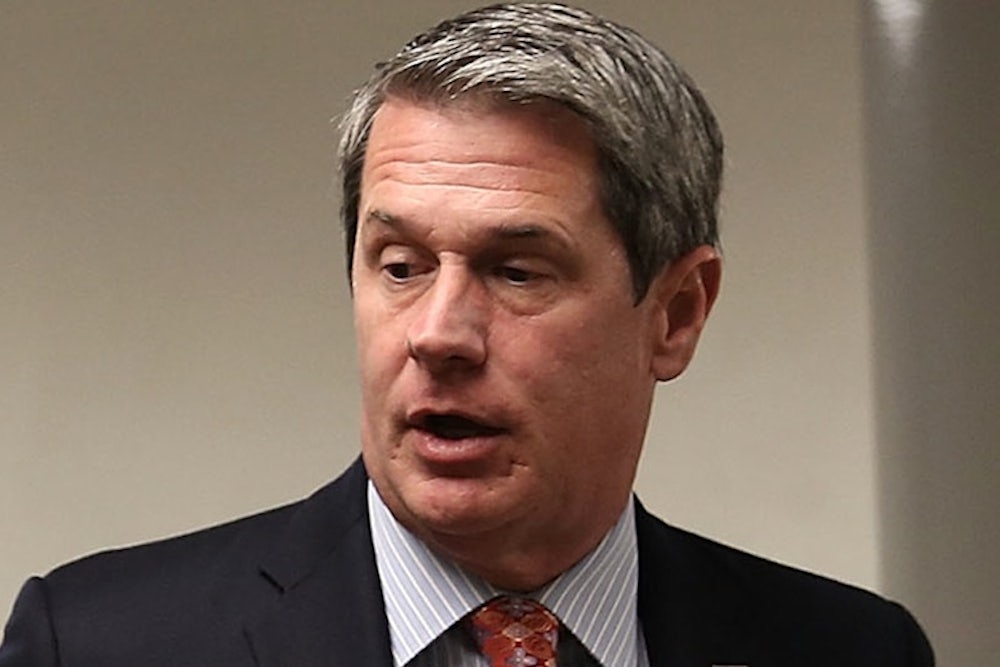Regardless of what happens Tuesday night on the Hill, the true dark-comedic nadir of the Big Beltway Brouhaha of 2013 was reached at 2:51 on Tuesday afternoon. That is when the National Review’s estimable Robert Costa reported that the House Republicans’ final proposal to reopen the federal government and avert a national credit default had been tweaked one last time. The proposal no longer included the repeal of the medical device tax—Republican leaders had added that earlier in the day, but some conservative members, to their credit, rightly decried the repeal as the crony capitalism that it is. This left House Republicans with one major final demand: to force a huge pay cut on their own staff.
Do I jest? Not at all. There is no better way to describe the “full Vitter,” which refers not to some workplace colloquialism in the escort services of Washington, D.C. and Louisiana, but rather to Senator David Vitter’s proposal to do away with the “Obamacare exemption” for Washington officials including members of Congress and most of their staff. The proposal polls great—why should congressmen get a special break? There’s just one problem: the exemption doesn’t actually exist. That Republicans have continued to milk it for cheap political points has been deeply depressing to watch. But it’s also symbolically perfect that the great charade of this whole chapter in Washington should in the end come down to a demand that is so cynical and hollow that its only real impact is to force a pay cut upon members’ own loyal and hard-working aides.
To recap, quickly: When the Affordable Care Act was being drafted, Sen. Chuck Grassley, the Iowa Republican, offered an amendment requiring that members of Congress and their staff be required to get their coverage in the new “exchanges” being created by the law. This made little sense—the exchanges are intended for individuals without employer-provided health insurance and small businesses, not for people already covered by large employers. But Democrats took Grassley’s bluff, to deprive Republicans of a talking point. Only later did Congress confront the consequences of this grandstanding: The law forced members and Hill staff to buy coverage in the exchanges, but did not lay out a way for their employer—the government—to continue paying its share of the premiums, as most other large employers do. Hill staff were going to be stuck with vastly higher health insurance costs—that is, a big pay cut.
To deal with this consequence, the Obama administration devised a workaround so that the federal government would continue picking up roughly the same share of the tab for Hill employees’ coverage, while still requiring them to buy coverage on the exchanges. Click-happy Beltway media outlets—one in particular—seized on this as an “exemption” from Obamacare, an irresponsible distortion that predictably fired up the conservative grass-roots. The Wall Street Journal editorial board fed the flames with exceedingly cynical calls to arms about Congress’ “carve-out” from the law, its “ad-libbed decision, at the 11th hour and on the basis of no legal authority, to create a special exemption for themselves from the ObamaCare health coverage that everybody else is mandated to buy.” This was flatly false – “everybody else” is not mandated to buy ObamaCare health coverage – tens of millions of people already covered by their employers are going to keep those plans; the singular treatment of the Hill was the requirement that it give up its coverage and go into Obamacare.
It was left to a few lonely voices to set the record straight, such as a persistent Wall Street Journal reader from Verona, N.J. and, impressively, an assistant editor at the National Review. But to no avail. By the time the great showdown arrived last month, the Obamacare exemption was the go-to talking point of congressional Republicans. Jim Jordan, the head of the House Republican Study Committee, made clear he had not spent much time studying this, decrying the “special treatment of congressional staff under Obamacare.” House leaders went along with the canard even as it emerged that Speaker John Boehner had been quietly cooperating with efforts to get the employer subsidies for staffers’ health care restored.
The exemption talk seemed to quiet down a bit of late as it dawned on more and more commentators just how much of a canard it really was. Vitter’s proposal had by Tuesday morning been winnowed down to a demand that simply actual members of Congress and top administration officials be forced to go without any employer contribution to the cost of their health coverage. But this afternoon, the “full Vitter” was back in full force, affecting staffers as well as top officials, reported Costa: “Conservatives…are now asking the leadership to expand the language. The leadership is expected to comply as a way of winning support.”
So here we are. David Vitter may want to enlist a soup-taster in the weeks ahead. Congressional staffers can now rest assured that their bosses’ cynicism makes no exemption for them. And the rest of us finally have an answer to Indiana Rep. Marlin Stutzman’s famous declaration days into the shutdown: “We have to get something out of this. And I don’t know what that even is.” Republicans did get something out of this: the everlasting scorn of tens of millions of Americans. Including many of the very people who work for them.
